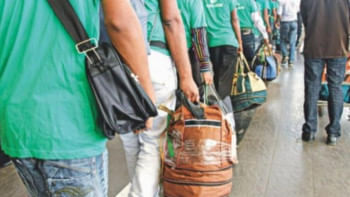Gap between inflation, wage growth hits 9-month high

The gap between inflation and the wage rate growth in Bangladesh rose to a nine-month high in May, deepening the cost-of-living crisis for the poor and the low-income groups as consumer prices continue to outpace real incomes.
Last month, the wages of low and unskilled workers grew 7.32 per cent, which was 2.62 percentage points lower than the inflation rate of 9.94 per cent recorded in the month, data from the Bangladesh Bureau of Statistics (BBS) showed.
The Wage Rate Index (WRI) of the BBS that takes into account the wages of workers across 44 occupations in agriculture, industry and services rose 7.23 per cent in April against a 9.24 per cent spike in the Consumer Price Index.
Although the wage growth has been slowly climbing since July last year, it has lagged the inflation rate for the 16th consecutive month.
Inflation in Bangladesh has been running high for more than a year after the outbreak of the Russia-Ukraine war exacerbated the disruptions in the global supply chain already broken by the coronavirus pandemic and brought about a global energy crisis.
At home, the surge in import bills, the energy shortage, the US dollar crisis, and market imperfections also contributed to the escalated level of consumer prices.
Rizwanul Islam, an economist and a former special adviser for the employment sector at the International Labour Office in Geneva, said real wages have been falling for almost a year and the rate of decline has quickened in recent months.
"The issue can no longer be taken as a transitory phenomenon, and some urgent action is required to protect the living conditions of the poor and low-income groups."
He said there is an institutional mechanism for reviewing and revising wage rates, but that is a time-consuming process.

"Rather than waiting for the process to be completed, interim arrangements must be made to tide over this time."
He recommended the private sector be encouraged to provide an interim allowance that may later be incorporated into the wage negotiations and agreements.
"Supply of essential consumer goods at fixed prices must be augmented and the sales through the Trading Corporation of Bangladesh must be made smoother and more efficient."
Selim Raihan, executive director of the South Asian Network on Economic Modeling (Sanem), said as the wage rate growth has remained below inflation for a long, it has led to the erosion of real income for lower-income groups.
The reduction in the buying capacity is hitting hard those who have no other source of income and only depend on wages, he said.
Inflation averaged 8.95 per cent in May, way higher than the revised target of 7.5 per cent for the financial year ending on June 30. The government has targeted to bring the annual average inflation to around 6 per cent in the next financial year.
Prof Raihan termed the government's inflationary target as absurd.
"And unfortunately, the government did not say in the budget how it would tackle higher inflation."
He warned that if the government does not ensure proper market monitoring in the coming days, inflation might go out of reach.
Raihan, a professor of the economics department at the University of Dhaka, said the way inflation is rising, the wage rate would not go up soon as the country's labour market is mostly informal.
"The increase in the wage rate is a slow process and it goes up gradually. In most cases, workers' bargaining power when it comes to wages, remuneration and job security is very limited," he said, adding that in many sectors, workers earn lower than the minimum wage.
Raihan went on to say that the government should emphasise correcting policy measures and setting targets on a priority basis.
"Still, there is time to take proper steps. If appropriate measures are not adopted, inflationary pressure may compound and the higher consumer prices may persist throughout the whole fiscal year."
The Sanem recently conducted a survey on lower-income groups with a sample size of 1,600 households across eight divisions.
The think-tank found that more than 96 per cent of the people reduced their meat consumption in the last six months to February.
"We found that the income of households remained unchanged in September to February but the food expenditure increased sharply," Raihan said.
Food inflation rose 40 basis points to 9.24 per cent in May. It was 8.84 per cent in April.
"Given the difficult situation, the government should expand the coverage and allocations of social protection schemes to prevent people from falling into deeper impoverishment," Prof Raihan said.
Yesterday, Planning Minister MA Mannan said: "The government will do whatever is required to bring down inflation."


 For all latest news, follow The Daily Star's Google News channel.
For all latest news, follow The Daily Star's Google News channel. 



Comments